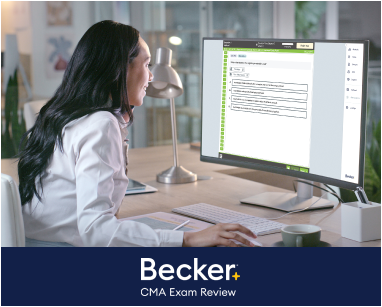
Making sure our students are studying accurate, exam-aligned content is a top priority at Becker. Our curriculum team regularly reviews and updates our CMA Exam Review so that it reflects the latest standards and industry guidance plus the learning outcome statements issued by the IMA. This ongoing process helps ensure our students are always prepared with the most current and comprehensive materials available.
When does Becker update the CMA Exam Review?
Becker’s curriculum team monitors communication from standard setting organizations to keep up with guidance changes and revisions. We also communicate with the Institute of Management Accountants (IMA) to discuss planned changes to the CMA Exam learning outcome statements and course specification outline. CMA Exam updates may be less frequent than updates to the CPA Exam, and the main reasons for updates to our CMA Exam Review are:
Exam content changes
The IMA has a content specification outline for the CMA Exam and learning outcome statements. When they change the learning outcome statements or update the content specification outline, Becker’s curriculum team works to ensure our content aligns with changes and revisions.
Student and instructor feedback
In addition to major updates and guidance changes, Becker’s curriculum team makes minor updates based on feedback from students, instructors, and our academic support teams. For example, if students report a gap in coverage or a confusing question, the curriculum team reviews and revises content to improve clarity and ensure comprehensive coverage of exam topics.
Recent updates to Becker's CMA Exam Review
Note that any changes made to the digital textbooks are provided in the Course Update Documents for Part 1 and Part 2. You can access and print the documents, which include replacement textbook pages, by clicking the Course Updates button under Additional Resources on the homepage of each part.
Also note that your progress will be updated in the units where content has been added or removed. For example, if you completed 80% of the essays for Part 2, Unit 4, Module 2 and new essays were added in this module, you will see your progress adjusted (e.g., 65%).
August 2025 updates
We released a minor content update for the CMA Exam Review course on Tuesday, August 26, 2025 to include:
- New essays and essay SkillBuilder videos:
- 2 essays for Part 1, Unit 1 (External Financial Reporting Decisions)
- 4 essays for Part 2, Unit 4 (Enterprise Risk Management)
- Newt™ AI assistant is now available for essays to answer your questions as you study.
- Removal of three multiple-choice questions in Part 1








